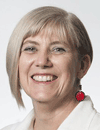Co-Located Conference AgendasGenomics Research Asia | Lab-on-a-Chip Asia Track A | Lab-on-a-Chip Asia Track B | Screening Asia | 

Tuesday, 12 November 2013 |
Advances in Enabling Discovery Technologies | Session Sponsors |
| | 08:00 | Registration | 08:15 |  | Keynote Presentation Imaging for Drug Discovery: from Trypanosomes to Tumours
Vicky Avery, Chief Investigator & Head of Discovery Biology, Griffith University, Australia
|
| 09:15 | Label-free Image-based Digital Holographic Microscopy (DHM) Integration in Screening Campaigns
Gerardo Turcatti, Director, Ecole Polytechnique Federale De Lausanne, Switzerland
Highly informative and cost-effective phenotypic screens can be routinely performed using the label-free DHM interferometric microscopy for cell-based assays. The methodological approaches developed include end-point primary screens and time lapse hits clustering/validations for drug discovery and toxicological applications. | 10:00 | Coffee & Networking in Exhibition Hall | 10:45 | Genome-Wide Screen Reveals Cellular Factors Required for Coronavirus Replication
Hui-Hui Wong, Lab Biologist, Frederic Bard Lab, Institute for Molecular and Cell Biology, Singapore
Coronaviruses are RNA viruses with a large zoonotic reservoir and propensity for host switching, representing a real threat for public health, as evidenced by SARS and the emerging MERS. Cellular factors required for their replication are poorly understood. Using genome-wide siRNA screening, we identified 83 novel genes supporting infectious bronchitis virus (IBV) replication in human cells.
| 11:30 | Cell Based Assays in Drug Discovery: Changing the HTS Paradigm
Hakim Djaballah, CEO, Institute Pasteur - Korea, Korea South
High content assays (HCA) have successfully evolved over the course of nearly two decades now, enabling us to perform highly complex cellular based screens, sometimes involving primary and/or human embryonic stem cells. With this development and acceptance as a screening platform, came data explosion requiring special logistics typically not associated with screening operations. I will present examples of how these cell based assays have allowed us to screen for modulators of different biologies and therapeutic areas notably not achievable through the classical target based approaches. I will also discuss our technology development effort capitalizing on HCA’s uses during the entire course of discovery. | 12:15 | Lunch & Networking in Exhibition Hall | 13:30 | Poster Viewing Session | 14:15 | 3D Chemical Compounds Screening Assay to Uncover Signaling Pathways Involved in CAFs-remodeling Tumor Microenvironment
Cedric Gaggioli, Baby Team Leader, Université Nice Sophia Antipolis, France
Carcinoma Associated Fibroblasts (CAFs) can lead collective carcinoma cells invasion by extracellular matrix remodeling and tracks formation through actomyosin-dependent force generation. Using chemical compounds screening assay based on 3D matrix remodeling by CAFs, we identified Janus Kinase (JAK) signaling pathway as a regulator of actomyosin contractility and matrix remodeling by stroma cells. | 15:00 | Identifying Chemotherapeutic Agents for Gastric Cancer: Assay Optimization to Hit Selection
Horst Flotow, Senior Project Manager, D3 (Drug Discovery and Development)e, Singapore
The newly opened Singapore Screening Centre conducts high-throughput screening to identify potential drug candidates against disease, using a library of over 500,000 chemical compounds. An oncology drug discovery project, carried out in collaboration with Duke-NUS Singapore will be presented and discussed. | 15:45 | Coffee & Networking in Exhibition Hall | 16:30 | Drug Discovery Using a C. elegans Model of a Protein Aggregation Disorder
Stephen Pak, Assistant Professor, University of Pittsburgh School of Medicine, United States of America
Accumulation of protein aggregates within cells is a common cause of tissue injury and degenerative disease. We have modeled a human protein aggregation disorder in C. elegans and performed whole organism-based small molecule screens to identify therapeutic compounds. Our data provide validation for the use of C. elegans in high-content drug screening campaigns. | 17:15 | Multi-cell-type Three-dimensional Microtissues in Screening: Efficient Automation from Cell Culture to Assay
Jan Lichtenberg, CEO and Co-Founder, InSphero AG, Switzerland
The combination of major tissue-specific cell types into scaffold-free, three-dimensional spheroid microtissues offers new possibilities for better de-risking of compounds and biologicals. The presentation illustrates three key screening applications: efficient 3D siRNA screening, efficacy of biologicals on 3D tumor co-culture microtissues and predictive early-stage de-risking of liver toxicity using primary hepatocyte co-cultures. | 18:00 | Leveraging the Power of Centralized Research Facilities on Disease Models for Basic Science, Drug Screening and Personalized Medicine
Spencer Shorte, Director, Institut Pasteur Imagopole, France
Analyses of disease models requires multiplexed and sophisticated imaging technology workflows capable to follow functional molecular dynamics in living systems from molecule, to cell, to tissue, and ultimately in vivo. Such facilities also require safe bio-containment (e.g. BSL2/BSL3) infrastructure. In our efforts at the Institut Pasteur Paris to develop such workflows we will discuss some of the major challenges facing us today. Notably those arising from the increasing need to establish experimental paradigms bearing greater relevance to the biology they aim to study. |
Wednesday, 13 November 2013 |
Natural Product Diversity & Novel Chemistries to Fill in the RnD Pipeline |
| | 09:00 |  | Keynote Presentation Screening Natural Product Extracts in Cell-free and Cell-based Assays Systems
Barry O'Keefe, Group Leader, National Institutes of Health, United States of America
Natural products are the source of >30% of all approved drugs world-wide and >50% of anti-cancer drugs approved over the last 10 years. Dr. O'Keefe will discuss screening strategies for the incorporation of crude natural product extracts into modern HTS screening programs at the National Cancer Institute. |
| 10:00 | Coffee & Networking in Exhibition Hall | 10:45 | Bioprospecting Natural Products for Potential Anti-fungal Drugs
Lixin Zhang, Professor, Chinese Academy of Sciences, China
To rapidly discover new antifungal agents for drug-resistant pathogens, we developed a high-throughput synergy screening (HTSS) strategy for novel microbial natural products. Here we report an unexpected consequence of MDR1 upregulation: it confers enhanced sensitivity to the natural product berberine. We show that berberine is indeed highly efficacious in inhibiting the growth of azole-resistant clinical C. albicans isolates, with upregulated MDR1, from HIV infected patients. | 11:30 | Natural Product Drug Discovery: From Extracts to Lead Compound Selection
Mark Butler, Senior Research Fellow, University of Queensland, Australia
This talk will discuss the generation of natural product-based screening libraries, strategies to screen the library and lead compound selection from the isolated compounds. | 12:15 | Lunch & Networking in Exhibition Hall | 13:30 | Poster Viewing Session | 14:15 | Building Screening Partnerships with Natural Products from Sarawak’s Biodiversity
Charlie Chia, Senior Research Officer/Chief Scientist, Sarawak Biodiversity Centre, Malaysia
The presentation will highlight the work of the Sarawak Biodiversity Centre (SBC) in sourcing of natural products in the forests of Sarawak on the island of Borneo for discovery and screening partnerships. | 15:00 | Monitoring Cellular Nucleotide Levels and its Relevance to Cellular Metabolic Function using Bioluminescence-based Strategies
Said Goueli, Clinical Professor & Research Fellow, Promega Corporation, United States of America
Regulation of energy charge ratio is critical for maintaining cellular homeostasis, thus monitoring cellular levels of adenine nucleotides is of paramount importance. We have developed a robust homogenous and HTS formatted technology to monitor the cellular nucleotides levels under various physiological conditions. | 15:45 | Coffee & Networking in Exhibition Hall | 16:15 | Natural Product Drug Discovery for Cancer: From Primary HTS Directly to Phase I Clinical Trial
Mark Frattini, Associate Professor, Columbia University Medical Center, United States of America
Natural products have been and continue to be an important source of therapeutic compounds for cancer therapy. I will present data describing identification of a natural product allosteric inhibitor of the human Cdc7 kinase, a heterodimeric serine/threonine kinase and an emerging target for cancer therapy. Importantly, this natural product was identified through HTS and is being taken directly to a Phase I clinical trial.
| 17:00 | Close of Conference |
|


 Add to Calendar ▼2013-11-12 00:00:002013-11-13 00:00:00Europe/LondonScreening AsiaScreening Asia in SingaporeSingaporeSELECTBIOenquiries@selectbiosciences.com
Add to Calendar ▼2013-11-12 00:00:002013-11-13 00:00:00Europe/LondonScreening AsiaScreening Asia in SingaporeSingaporeSELECTBIOenquiries@selectbiosciences.com